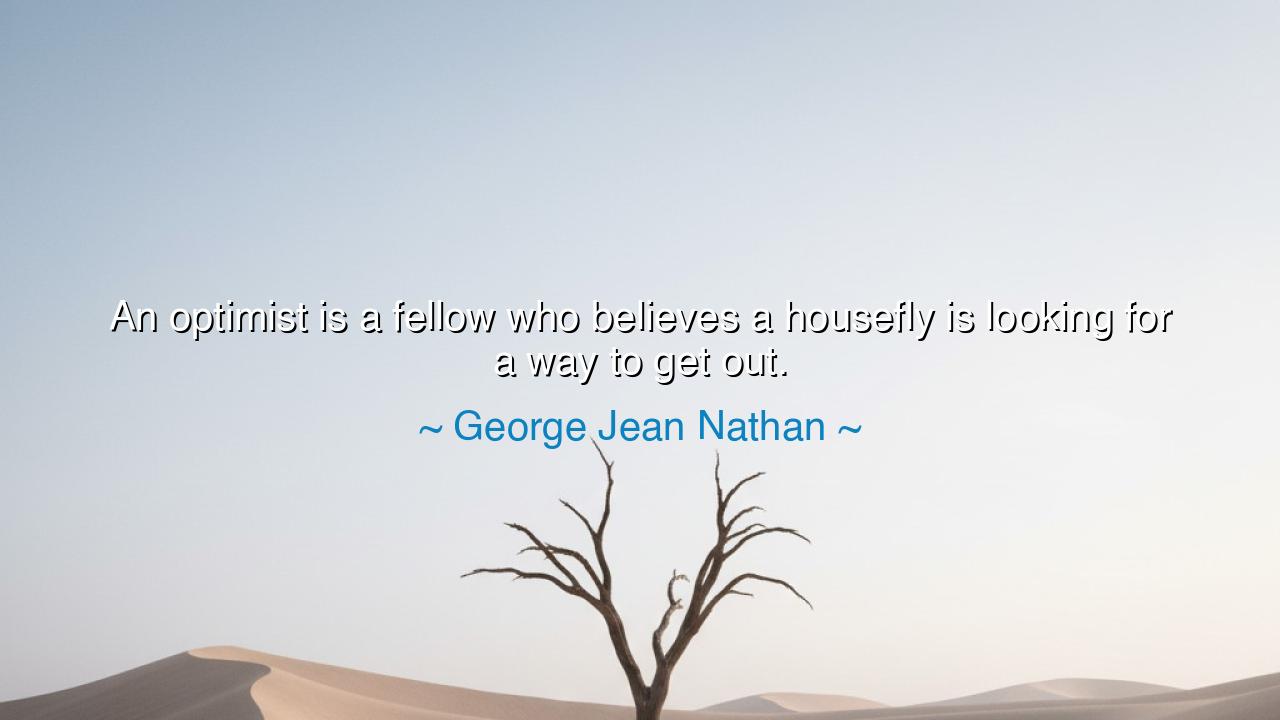
An optimist is a fellow who believes a housefly is looking for a






When George Jean Nathan remarked, “An optimist is a fellow who believes a housefly is looking for a way to get out,” he did not merely make a witty observation about the nature of optimism, but rather, he unearthed the profound gulf between hope and reality. Nathan’s words offer us a glimpse into the mind of an optimist — one who, despite evidence to the contrary, holds fast to the belief that all things, even the most trivial or seemingly hopeless, are destined for some higher good. The optimist, in Nathan’s eyes, is not blind to the struggles and frustrations of life, but chooses to see them through the lens of possibility — even in the humblest, most inconsequential of creatures, like the housefly.
The housefly, forever trapped in its endless circuit against glass windows, strikes the optimist as a symbol of persistence and hope. In the optimist’s eyes, it is not a creature in despair, but one with purpose — seeking a way out, a door to freedom. This vision, both comical and endearing, underscores the essence of optimism: a belief in potential, a faith that even in what seems like confinement, there is a way forward, even if we cannot always see it. The optimist does not see the fly’s endless struggle as a futile endeavor, but as a sign of life, a sign of trying, a sign that every effort matters.
Yet, Nathan’s words also contain a hint of irony. For as much as the optimist may see the housefly as searching for a way out, the reality is that the fly’s repeated movements are simply a reflection of its instincts, not a pursuit of freedom. It circles aimlessly, propelled by forces it cannot comprehend. In this sense, Nathan’s quote touches upon the delicate balance between blind optimism and the harsh truths of existence. The housefly is not really seeking a way out — it is simply responding to its impulses, just as humans, in their optimism, often move towards goals that may be unreachable, thinking that if they simply try harder, they will succeed.
In the world of historical figures, we find both the ideal and the cautionary tale of optimism. Take Winston Churchill, for example, whose optimism during World War II was both a beacon of hope and a force that inspired his people to endure through seemingly endless darkness. Churchill, seeing beyond the current moment, believed that victory was possible, even when the odds were against him. Yet there is also the story of Robert Falcon Scott, the famed explorer, whose relentless optimism led him to push forward into the Antarctic with unwavering faith, only to meet a tragic end. His story is a reminder that unbridled optimism, without clear vision or a realistic understanding of the world, can lead one into perilous territory, much like the housefly, trapped in a futile cycle.
The meaning of Nathan’s quote, then, is twofold. On one hand, it celebrates the power of hope — that essential quality that keeps the spirit alive even in the face of adversity. But on the other hand, it is a gentle caution, urging us to question whether our optimism is based in reality, or whether it is simply an endless pursuit of something unattainable. Like the housefly, we may circle in our struggles, believing there is always a way out, even when we are too close to see the glass that confines us. True optimism requires not just belief in the positive, but also an understanding of the limitations that shape our world.
In our own lives, this lesson is crucial. To be an optimist is to embrace possibility and to fight against despair, but it is also to recognize the truth — that hope, when rooted in reality, can be the spark that lights the way forward. It is about understanding that while the world may seem full of obstacles, there are always avenues to explore, doors to open, and challenges to face with courage and determination. The true optimist is not blinded by false hopes, but instead, sees beyond the barriers and believes in the possibility of growth and change, no matter how small or distant the outcome may seem.
The lesson we must take from Nathan’s words is this: hope is powerful, but it must be tempered by wisdom. Optimism is not just about seeing the glass as half full; it is about seeing the world with clear eyes, understanding both its beauty and its limitations, and yet choosing to move forward, trusting that even the smallest efforts have meaning. Be like the fly, in its pursuit — not of an illusion, but of a truth that lies beyond the surface.
Practical actions for the hopeful soul:
-
Balance optimism with realism — see the obstacles, but focus on the opportunities.
-
Recognize when persistence becomes folly — sometimes, change comes from changing direction, not merely pushing harder.
-
Cultivate hope in the face of adversity, but do not let it blind you to the realities that shape your world.
-
Celebrate small victories, for they are the steps that lead to greater transformation.
For as George Jean Nathan reminds us, optimism is a gift, but it must be shaped by both the spirit of possibility and the grounding force of reality. The fly may circle endlessly, but it is in our awareness of its journey — and our own — that we find the wisdom to move forward with true hope.






AAdministratorAdministrator
Welcome, honored guests. Please leave a comment, we will respond soon